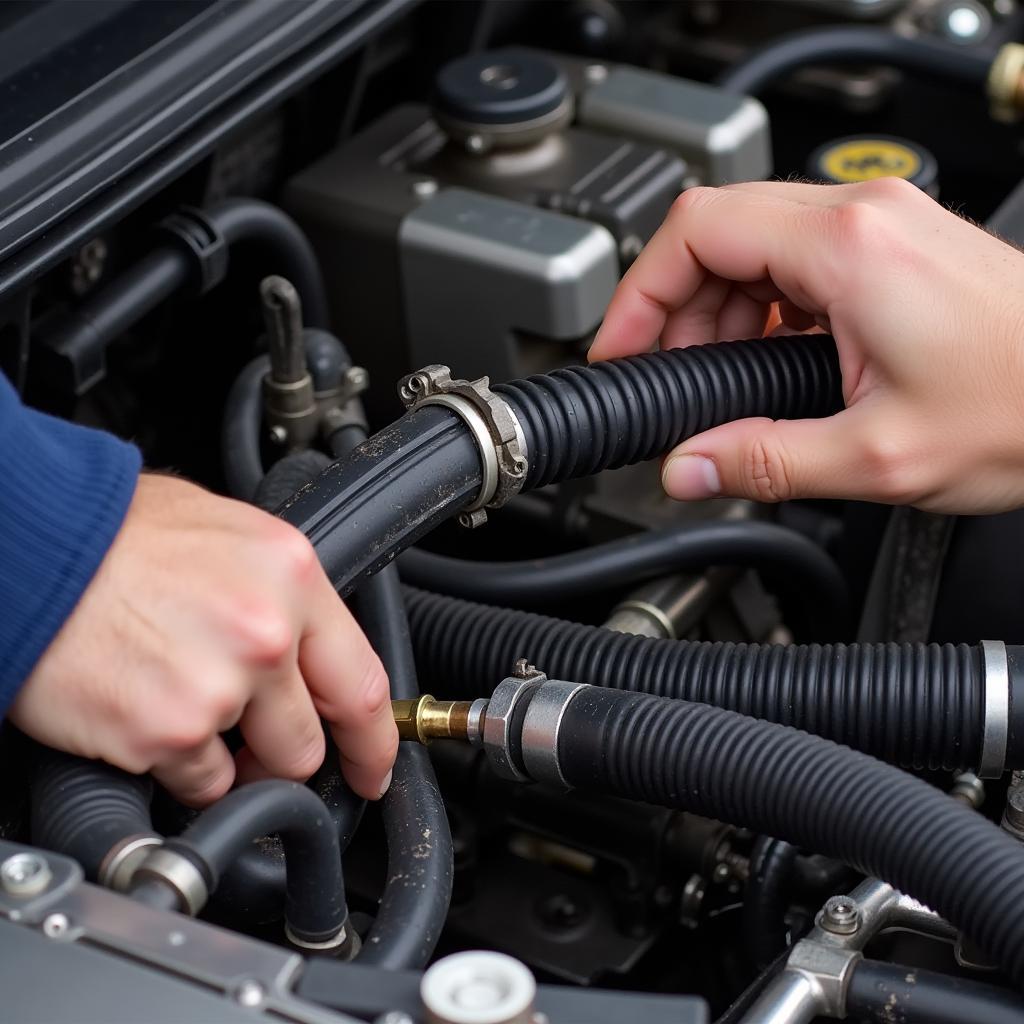A high idle hissing sound coming from your car can be annoying and indicate a potential problem. This guide will help you diagnose and fix high idle hissing car issues, covering common causes, troubleshooting steps, and potential solutions.
Understanding the Hissing Sound
A hissing sound at high idle often suggests a vacuum leak, an issue where air is being drawn into the engine through an unintended pathway. This disrupts the carefully balanced air-fuel mixture, leading to performance problems and potentially damaging your engine. Other less common causes include exhaust leaks, problems with the PCV valve, or issues with the intake manifold gasket. Ignoring the hiss can lead to decreased fuel efficiency, rough idling, and even engine damage.
Common Causes of High Idle Hissing
Several components can contribute to a high idle hissing sound. Identifying the culprit requires a systematic approach. Here’s a breakdown of the most frequent offenders:
- Vacuum Hoses: These rubber hoses are prone to cracking, drying out, or becoming disconnected, creating a vacuum leak.
- Intake Manifold Gasket: This gasket seals the connection between the intake manifold and the engine block. A damaged gasket can cause a significant vacuum leak.
- PCV Valve: The Positive Crankcase Ventilation (PCV) valve regulates the flow of gases from the crankcase. A faulty PCV valve can create a hissing sound, especially at idle.
- Throttle Body Gasket: Similar to the intake manifold gasket, a leaking throttle body gasket can also lead to a hissing noise.
- Exhaust Leaks: While less common at idle, a leak in the exhaust system can sometimes produce a hissing sound.
Diagnosing the Hiss: A Step-by-Step Guide
- Locate the Hiss: Pop the hood and try to pinpoint the source of the hissing sound. Is it coming from the front, back, or sides of the engine?
- Visual Inspection: Carefully examine all vacuum hoses for cracks, disconnections, or signs of wear. Pay close attention to areas around the intake manifold, throttle body, and PCV valve.
- The “Carb Cleaner” Test (For Fuel-Injected Engines): With the engine running at idle, carefully spray carb cleaner around suspected leak areas. If the engine speed changes (either increases or decreases), you’ve likely found the leak. Caution: Be extremely careful when working with flammable materials near a hot engine.
- Check the PCV Valve: Remove the PCV valve and shake it. If it rattles, it’s likely still good. If it doesn’t rattle, it might be clogged and needs replacing.
 Mechanic Checking Vacuum Hoses for Leaks
Mechanic Checking Vacuum Hoses for Leaks
Fixing the Problem
Once you’ve identified the source of the hiss, the fix can be relatively simple.
- Replacing Vacuum Hoses: Replacing a damaged vacuum hose is a straightforward process. Simply disconnect the old hose and replace it with a new one of the same size and shape.
- Replacing Gaskets: Replacing gaskets, such as the intake manifold or throttle body gasket, is a more involved process and may require some mechanical skill.
- Replacing the PCV Valve: Replacing the PCV valve is typically a quick and easy fix.
When to Seek Professional Help
While some fixes can be DIY projects, others require specialized tools and expertise. If you’re uncomfortable working on your car’s engine, it’s always best to consult a qualified mechanic.
“A hissing sound, however small, shouldn’t be ignored,” advises John Miller, a certified automotive technician with over 20 years of experience. “It’s often an early warning sign of a bigger problem, and addressing it promptly can save you time and money in the long run.”
Conclusion
Addressing a high idle hissing car issue starts with proper diagnosis. By following the steps outlined in this guide, you can pinpoint the source of the problem and determine the necessary repairs. Remember, a small hiss can indicate a larger underlying issue, so addressing it promptly is crucial. Don’t hesitate to connect with us at AutoTipPro for further assistance. Call us at +1 (641) 206-8880 or visit our office at 500 N St Mary’s St, San Antonio, TX 78205, United States.
FAQ
- Can a vacuum leak cause other problems? Yes, a vacuum leak can lead to decreased fuel efficiency, rough idling, and even engine damage.
- How much does it cost to fix a vacuum leak? The cost varies depending on the location and severity of the leak.
- What tools do I need to diagnose a vacuum leak? A visual inspection can often identify a leak, and carb cleaner can help pinpoint the exact location.
- Can I drive my car with a vacuum leak? While you can technically drive with a small vacuum leak, it’s not recommended as it can lead to further damage.
- Is a hissing sound always a vacuum leak? Not always, it can also be caused by exhaust leaks or issues with the PCV valve.
- How often should I check my vacuum hoses? It’s a good idea to inspect your vacuum hoses during regular maintenance checks.
- Can I fix a vacuum leak myself? Replacing vacuum hoses is a relatively simple DIY task, but more complex leaks may require professional help.




Leave a Reply